1. About: Open-Ended Questions
Open-ended questions require students to respond with original answers.
These types of questions range from one-word responses to full essays. Typically, open-ended questions are manually graded; however, D2L can auto-grade these questions if students' responses are an exact match to the correct answer or if Regular Expression algorithms are used to account for variations.
2. Create: Fill-in-the-blank(s) Questions
You provide a sentence or paragraph with a blank space for students to fill with missing text.
- Select Quizzes from the course navbar.
- Click on the Question Library tab.
- Click on the name of any Section folder to open it.
- Click the New button.
- Select Fill in the Blanks Question (FIB) from the menu.
Note: We recommend leaving the Title field blank. The Question Text will become the title by default, allowing you to see the question without having to click to open it.
- Enter the number of Points this question will be worth.

- If this question has an image, click the Insert Image button to upload it from your computer. Use the Description field to provide information about the image.
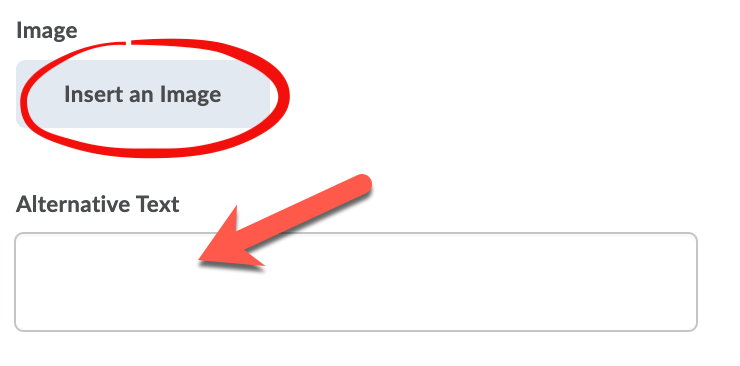
- Set up the structure of your FIB question. By default, this question consists of a starting text field, a blank, and a finishing text field.
- If you would like students to have more than one answer blank, click the Add Blank (plus sign) icon.

- Unless the blank needs to be at the end of the phrase, sentence, or paragraph, you will need to add an additional text field, which you do by clicking the Add Text (plus sign) icon.

- Use the trash can icon to the right of any blank or text field you want to delete.
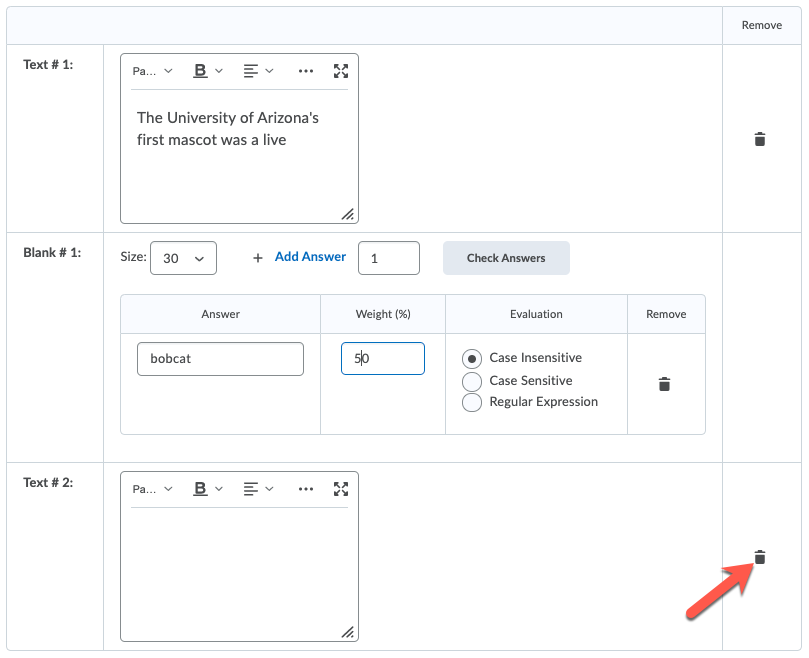
- If you would like students to have more than one answer blank, click the Add Blank (plus sign) icon.
- Enter the text of your sentence(s) within the text field(s).
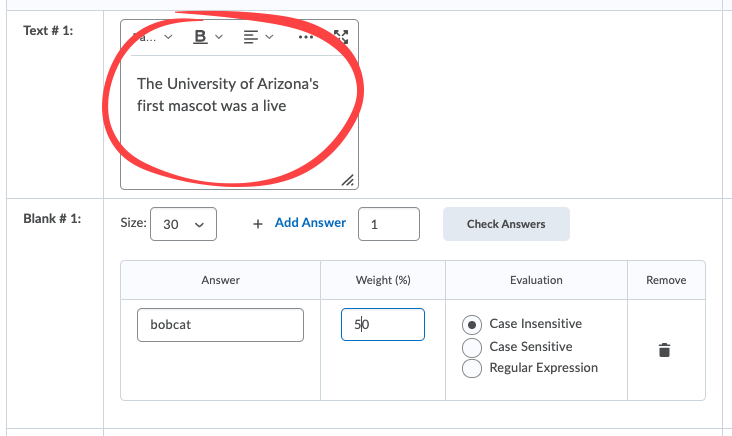
Note: When pasting text, D2L will inherit any formatting (e.g. font type and size, indentations, etc.) embedded in the source document. We recommend that you remove all formatting, and use the following keyboard shortcuts to paste your text: for PC press CTRL+Shift+V; for MAC press Command+Shift+V.
- Enter the correct answer(s) in the blank field(s).
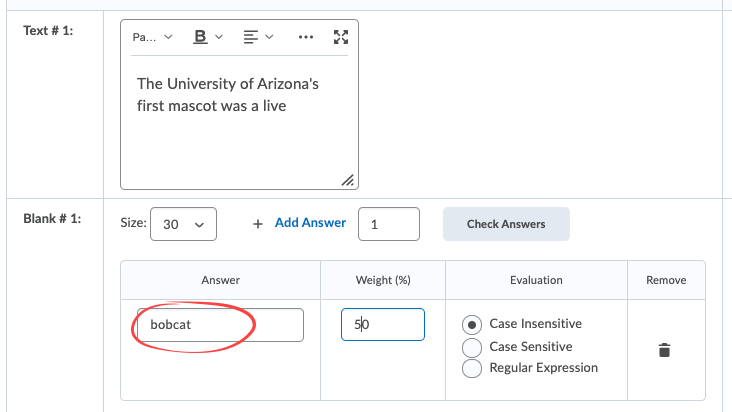
Note: D2L can autograde FIB questions if the student's answer is an exact match to the answer you provide or if Regular Expression algorithms are used.
- Specify how you want D2L to assess this question.
- Enter a 100 in the weight field if you have one answer. If you have two or more answers, apportion the weight between answers. Weights must add to 100%.
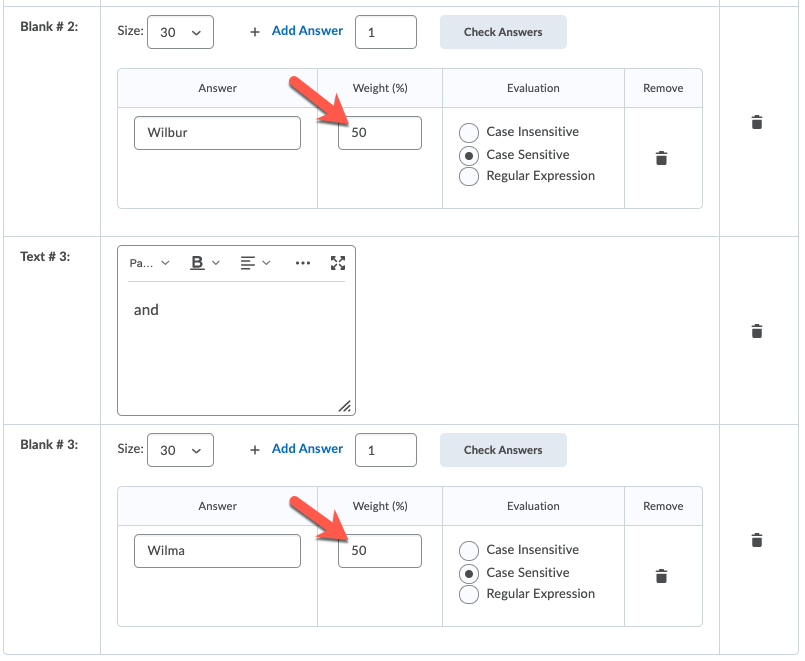
- Decide the evaluation criteria you want D2L to use for each answer:
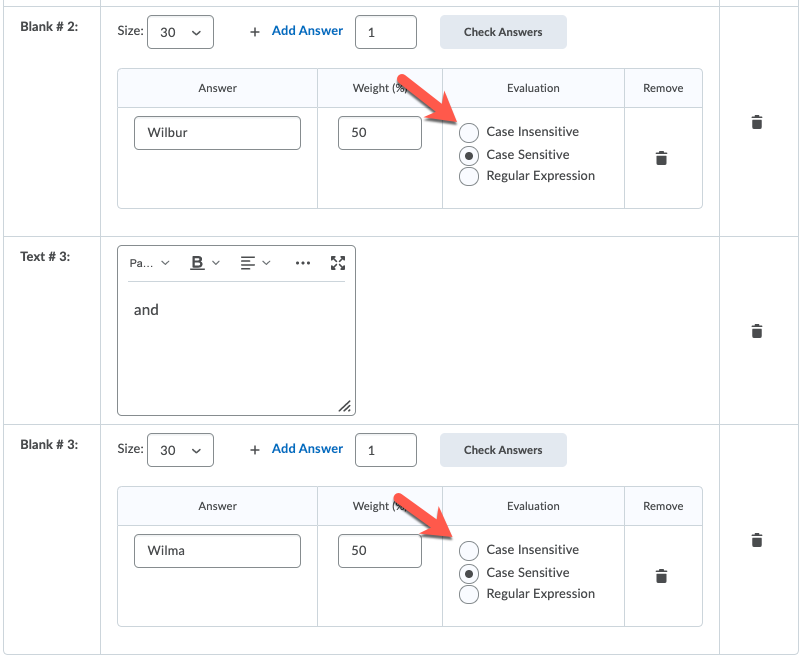
- Case Insensitive: capitalization does not affect the score.
- Case Sensitive: proper capitalization is required.
- Regular Expression: uses letters and other symbols to create a pattern that describes a range of acceptable text strings. For an introduction to Regular Expressions, watch this D2L video and/or see Auto-Grading Options, Regular Expressions.
- Create variations on the correct answer. For example, if the correct answer is "10 cm", but you will give partial credit for the answer "10":
- Click the Add Answer option (above the blank).
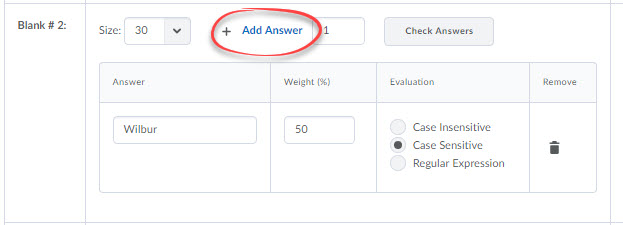
- Assign a partial weight for the additional answer(s).
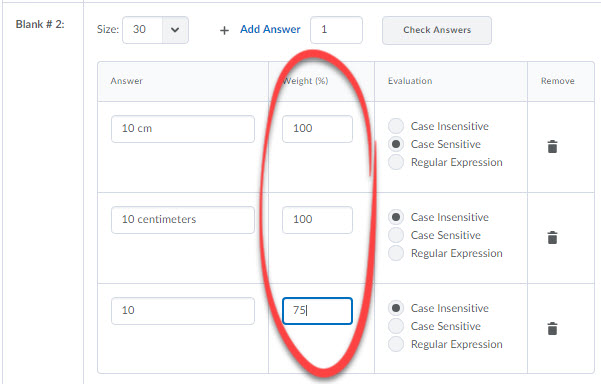
- Click the Add Answer option (above the blank).
- Enter a 100 in the weight field if you have one answer. If you have two or more answers, apportion the weight between answers. Weights must add to 100%.
- Click the Preview button to see how the question will look to students.

- Click the Save button to save your question, or Save and Close to save and return to the Question Library.

3. Create: Short Answer Questions
Students respond to a question with single word or phrase answers.
Note: SA questions work well when used with an image, for example an image of a brain with itemized parts that students must label or a numbered map for which students must provide place names. In cases where spelling, wording, and answer order are exact, D2L can auto-grade.
Note: When pasting text, D2L will inherit any formatting (e.g. font type and size, indentations, etc.) embedded in the source document. We recommend that you remove all formatting, and use the following keyboard shortcuts to paste your text: for PC press CTRL+Shift+V; for MAC press Command+Shift+V.
- Select Quizzes from the course navbar.
- Click on the Question Library tab.
- Click on the name of any Section folder to open it.
- Click the New button.
- Select Short Answer Question (SA) from the menu.
Note: We recommend leaving the Title field blank. The Question Text will become the title by default, allowing you to see the question without having to click to open it.
- Type or paste your question into the Question Text box.

Note: Click directly on the Question Text field to open a toolbar that will allow you to add pictures and media to your question.
- Click Add Blank until you have the desired number of answer choices for this question.

- Type or paste the correct answers into the answers blanks. One answer per blank. The order of the answers does matter.

Note: These questions are meant for single word or short phrase responses. You cannot change the size of the answer box, although the size does not limit how much text students can enter.
- For each answer, use the abc dropdown menu to select one of the following:
- Text: if the answer is not case-sensitive.
- Case-Sensitive Text: if letter case matters.
- Regular Expression: uses letters and other symbols to create a pattern that describes a range of acceptable text strings. For an introduction to Regular Expressions, watch this D2L video and/or see Auto-Grading Options, Regular Expressions.
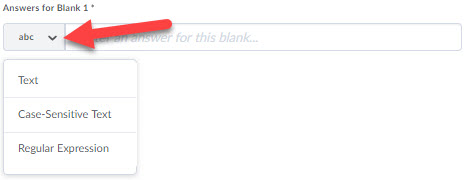
- Enter the number of points the question is worth in the Default Points field.

- To designate how points will be assigned to blanks, use the dropdown menu and select one of the following:
-
Students will receive part marks: students receive points for every correct answer; D2L automatically does the calculations based upon the number of points the question is worth.
- Students must answer all blanks correctly: D2L will give points only if a student provides all of the correct answers.
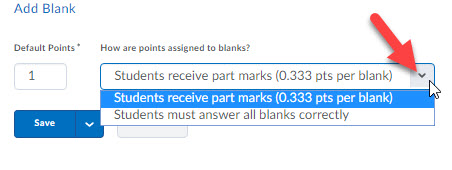
-
- Preview the question to make sure it looks the way you want; note that D2L automatically shows you how the question will appear on the quiz.
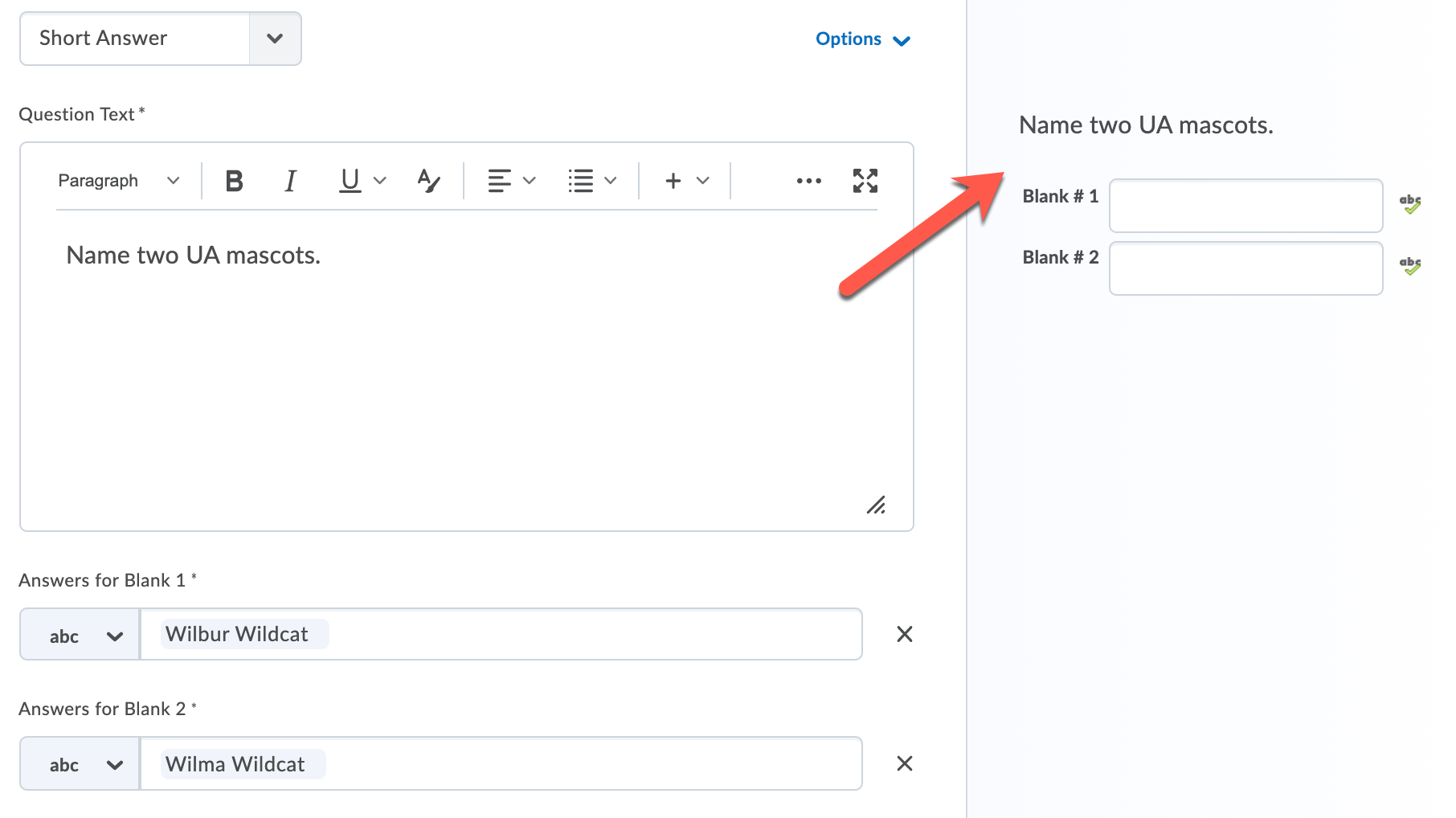
- Click the Save button to save your question and return to the Question Library.
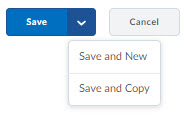
Note: Click the down arrow next to the Save button for more options. Save and New will save your current question and open a new True/False question. Cancel will return you to the Question Library without saving your changes.
4. Create: Multi-Short Answer Questions
These questions allow for multiple correct answers to a single question prompt.
For example, students can be asked to name any 4 of the 50 state capitols.
- Select Quizzes from the course navbar.
- Click on the Question Library tab.
- Click on the name of any Section folder to open it.
- Click the New button.
- Select Multi-Short Answer Question (MSA) from the menu.
Note: We recommend leaving the Title field blank. The Question Text will become the title by default, allowing you to see the question without having to click to open it.
- Enter the number of Points this question will be worth.

- Type or paste your question into the Question Text box.

- If this question has an image, click the Insert Image button to upload it from your computer. Use the Alternative Text field to provide information about the image.
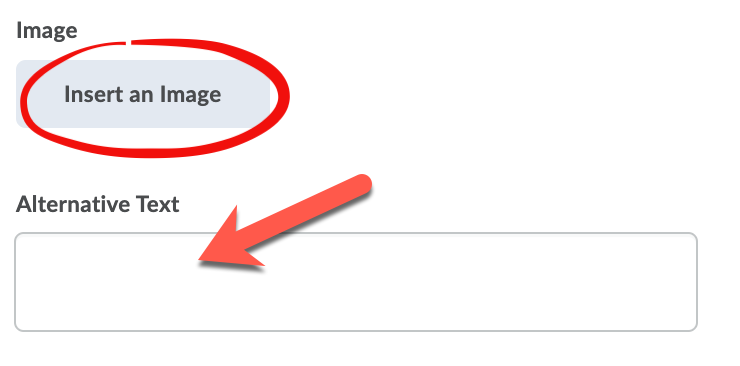
- Create the number of Input Boxes; one box for each answer you expect students to provide.

- Size the answer fields by adjusting the number of Rows and Columns that will fit in each.

Note: The size of the answer field does not restrict how much text a student can enter. They do provide an idea of how long you expect each answer to be.
- Add Answer fields by entering the number of fields you need (e.g. one for each of the 50 state capitols) and clicking Add Answer.

- Enter the correct answers into the Answer Fields.
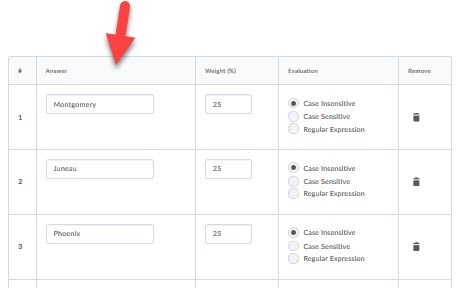
- Enter the Weight. For example, in the capitol example, the student is to provide 4 answers. That means each answer equals 25% of the value of the question (5 answers means each answer is worth 20%, 6 answers means each answer is worth 16.66%, and so forth).
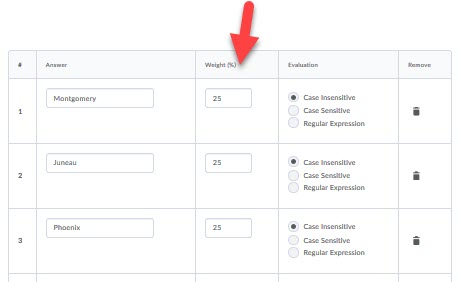
- Decide the Evaluation criteria you want to use for each answer:
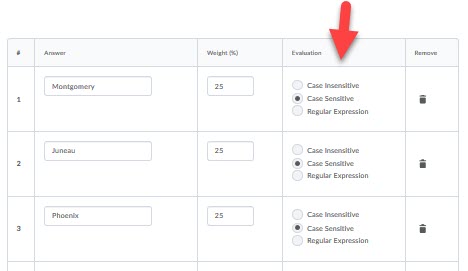
- Case Insensitive: capitalization does not affect the score.
- Case Sensitive: proper capitalization is required.
- Regular Expression: uses letters and other symbols to create a pattern that describes a range of acceptable text strings. For an introduction to Regular Expressions, watch this D2L video and/or see Auto-Grading Options, Regular Expressions.
- Click the Save button to save your question, or Save and Close to save and return to the Question Library.

5. Create: Written Response Questions
These are essay questions. Plus, students can add images and files.
Answers can range in length from a sentence to multiple paragraphs. Also, students can attach files, meaning they can show their work on complex math problems, share pictures of their work, add supporting documents, and so on.
- Select Quizzes from the course navbar.
- Click on the Question Library tab.
- Click on the name of any Section folder to open it.
- Click the New button.
- Select Written Response Question (WR) from the menu.
Note: We recommend leaving the Title field blank. The Question Text will become the title by default, allowing you to see the question without having to click to open it.
- Type or paste your question into the Question Text box.

Note: When pasting text, D2L will inherit any formatting (e.g. font type and size, indentations, etc.) embedded in the source document. We recommend that you remove all formatting, and use the following keyboard shortcuts to paste your text: for PC press CTRL+Shift+V; for MAC press Command+Shift+V.
- Enter the number of points the question is worth in the Default Points field.

- Click the Options menu

- Select Add Custom Response Box Size
Note: Customizing the response box size indicates to students how long you expect their answers to be. The box size does not limit the amount of text a student can enter.
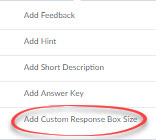
- In the new field that appears, select the size of the response box you want to appear on the quiz.

- You can add an answer key that only graders, TA's, and instructors can see.

- To allow students to embed images and attach files to their answer, select Enable inserted images and attachments.
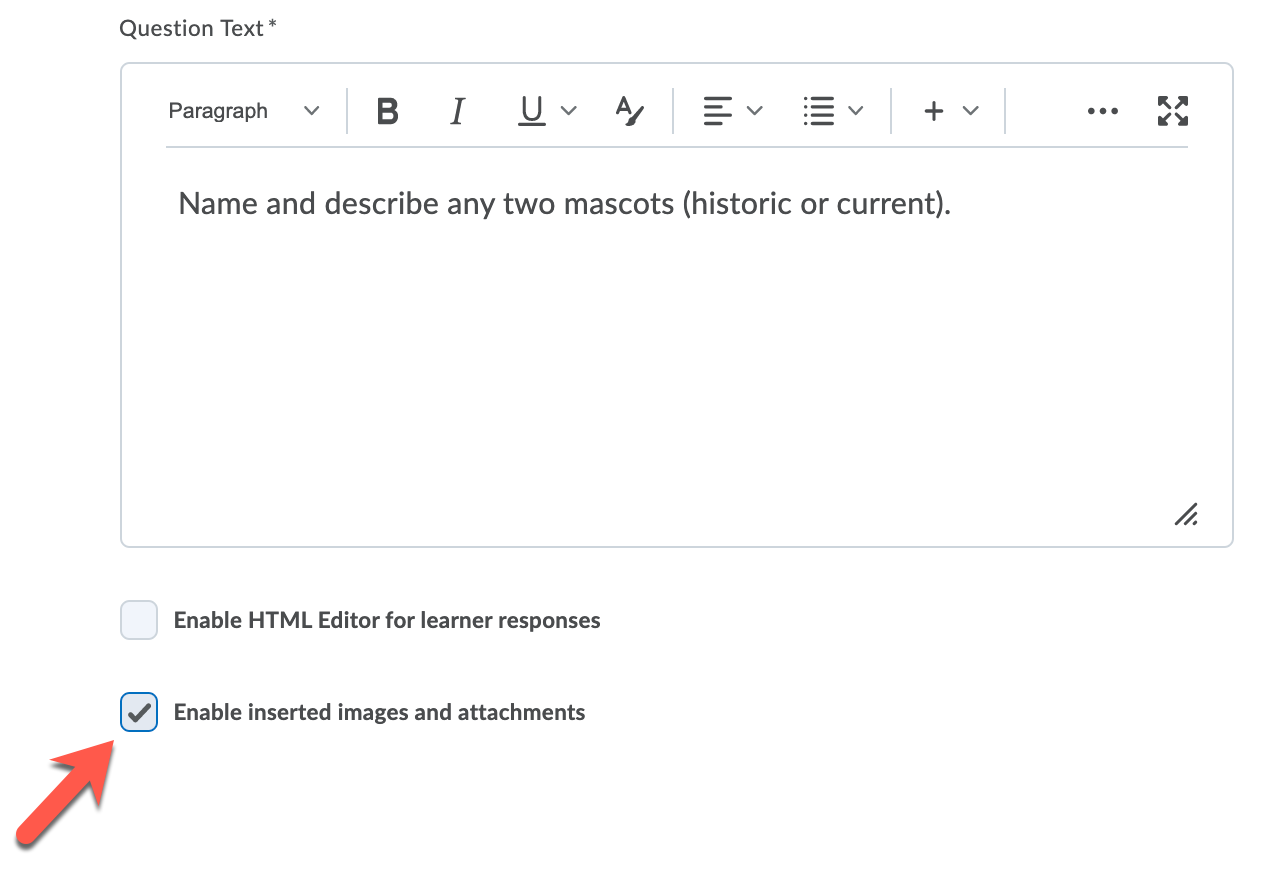
Note: The maximum file size for a single attached file or embedded image is 102400 KB (100MB). The maximum for all of a student's attached/embedded files to the question is 102400 KB (100MB).
- Preview the question to make sure it looks the way you want; note that D2L automatically shows you how the question will appear on the quiz.
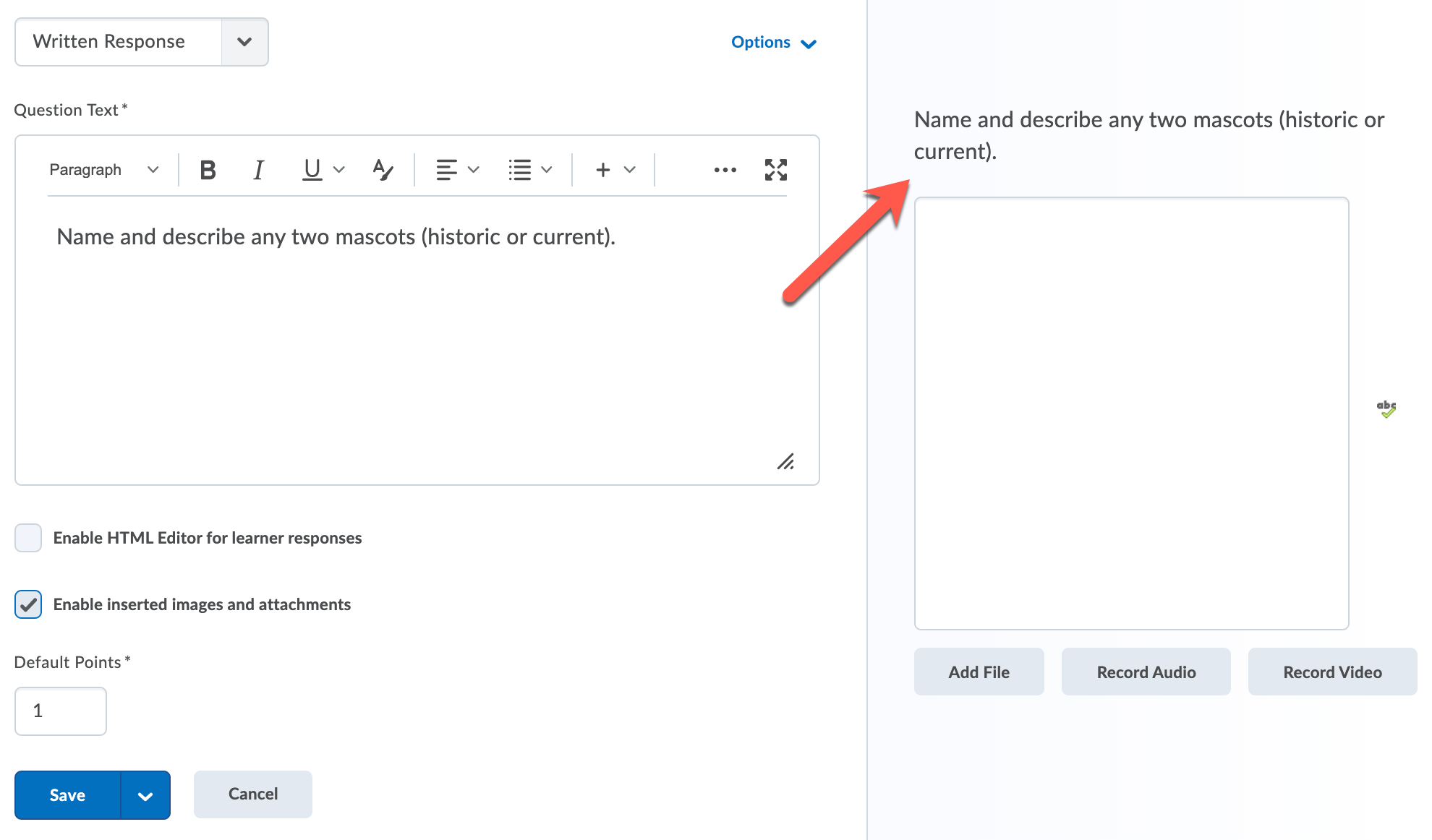
- Click the Save button to save your question and return to the Question Library.

Note: Click the down arrow next to the Save button for more options. Save and New will save your current question and open a new True/False question. Cancel will return you to the Question Library without saving your changes.

